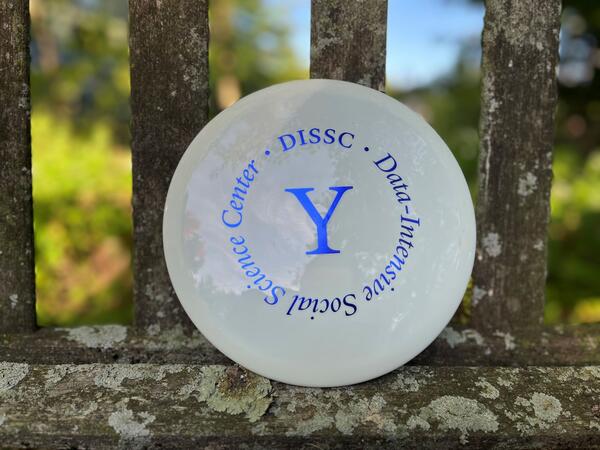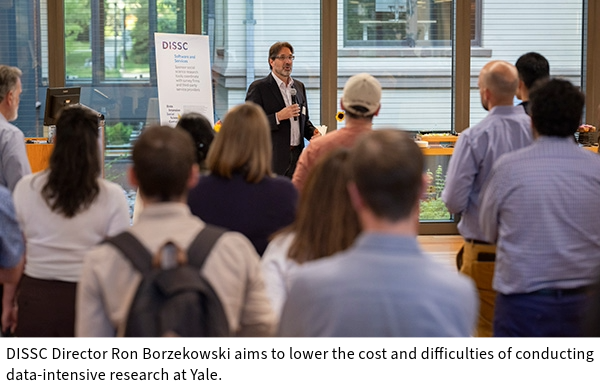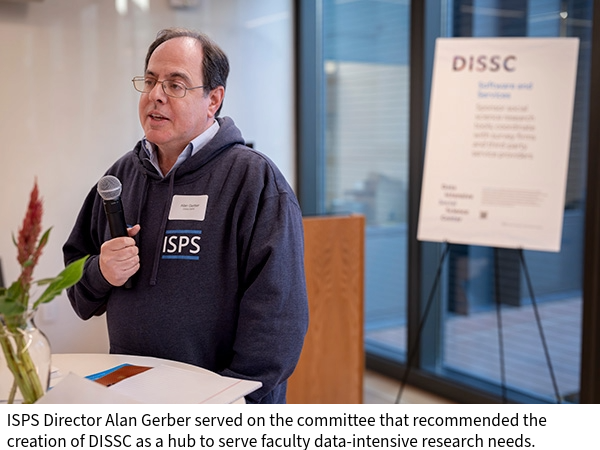Unlocking Data: Yale’s DISSC Supports Social Science Breakthroughs

Yale social science researchers answer questions for a living. But in the process of conducting such research, they might first need answers to a series of logistical questions. Such as:
Where can I store my data that is large enough, safe enough, and accessible for other researchers? Where can I obtain the data I need? How do I contract with a company that may be wary of providing its data for research? What is the process involved in buying time on someone else’s survey? Do I need to buy a piece of software, or is someone else on campus already using it?
Answers to many such questions have been available at Yale but not necessarily easily found. Now the Data-Intensive Social Science Center (DISSC) is open for business, ready to help answer such questions, and more.
“Our job is to lower the cost of doing data-intensive work,” said Ron Borzekowski, the inaugural director of DISSC. “Social science is a high-fixed-cost enterprise. There are lots of barriers to doing this kind of work. Our team and our partners throughout the university are here to make learning about society much easier to do.”

At a kickoff event earlier this month, Borzekowski thanked Yale’s Information Technology Services, Yale Library, the Center for Research and Computing, and the Center for Geospatial Solutions, among others, for supporting DISSC’s mission.
DISSC began as a series of recommendations by a committee of social scientists from across the university who first met in 2019. They proposed a campus hub to manage and facilitate the collection, protection, and utilization of new, frequently large datasets that are currently revolutionizing fields like political science, economics, psychology, and sociology.
“DISSC is something that came out of a faculty process to address faculty needs,” said Alan Gerber, director of Yale’s Institution for Social and Policy Studies, Sterling Professor of Political Science, and chair of the committee that led to DISSC’s creation. “We are grateful for the university’s support and invite our colleagues to engage with the center as it grows — let us know if it is doing its job. Which is to help everyone do more ambitious and exciting work. We want to make it a pleasure to do research at Yale.”

The Office of the Provost provides DISSC with infrastructure resources, and ISPS and the Tobin Center for Economic Policy provide administrative support. Gerber and Tobin Center Faculty Director Steven Berry, David Swensen Professor of Economics, serve as DISSC’s faculty directors.
“We are extremely pleased to see DISSC take shape through the recommendations of the committee chaired by Alan and the more recent implementation committee chaired by Susan Gibbons,” said Michael Crair, vice provost for research and the William Ziegler III Professor in the Departments of Neuroscience and Ophthalmology & Visual Science. “It will provide the necessary physical and intellectual support to enrich our thriving social science research community and will help cultivate and accelerate the academic productivity of our students and faculty.”
DISSC has begun to centralize and improve existing services and processes involving social science data, purchase or build new technology and services to improve research, and host events to foster a community of scholars who can more easily share the latest research tools, focused on the security, reliability and reproducibility of their work.
“Yale’s social science research community serves as a tremendous engine for discovery, and DISSC will offer a better way for this community to engage and share information, increasing productivity and spurring innovative research,” Borzekowski said. “We want to ensure that Yale continues to lead.”
Located at 85 Trumbull St., DISSC has technical staff working on data architecture and research environments, programming, data acquisition, and open science and repositories.
DISCC faculty liaisons include Robert Frank, professor of linguistics; Eduardo Fernandez-Duque, professor of anthropology; Eli Fenichel, Knobloch Family Professor of Natural Resource Economics; Joshua Kalla, associate professor of political science; Balázs Kovács, professor of organizational behavior; Yusef Ransome, associate professor of public health; Robb Rutledge, assistant professor of psychology; Sarath Sanga, professor of law; Winnie van Dijk, assistant professor of economics; and Emma Zang, assistant professor of sociology.
“If you have questions, if you have comments, if you have suggestions, please let us know,” Borzekowski said, encouraging faculty, doctoral students, and postdoctoral associates to send emails to dissc@yale.edu. “This only works if we have deep connections with our research community and understand your needs.”